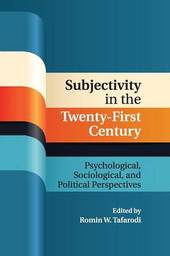
|
Subjectivity in the Twenty-First Century: Psychological, Sociological, and Political Perspectives
Paperback / softback
Main Details
| Title |
Subjectivity in the Twenty-First Century: Psychological, Sociological, and Political Perspectives
|
| Authors and Contributors |
Edited by Romin W. Tafarodi
|
| Series | Culture and Psychology |
|---|
| Physical Properties |
| Format:Paperback / softback | | Pages:262 | | Dimensions(mm): Height 230,Width 150 |
|
| ISBN/Barcode |
9781316502822
|
| Classifications | Dewey:306.019 |
|---|
| Audience | | Tertiary Education (US: College) | | Professional & Vocational | |
|---|
| Illustrations |
1 Tables, unspecified
|
|
Publishing Details |
| Publisher |
Cambridge University Press
|
| Imprint |
Cambridge University Press
|
| Publication Date |
17 December 2015 |
| Publication Country |
United Kingdom
|
Description
What is it like to be a person today? To think, feel, and act as an individual in a time of accelerated social, cultural, technological, and political change? This question is inspired by the double meaning of subjectivity as both the 'first-personness' of consciousness (being a subject of experience) and the conditioning of that consciousness within society (being subject to power, authority, or influence). The contributors to this volume explore the perils and promise of the self in today's world. Their shared aim is to describe where we stand and what is at stake as we move ahead in the twenty-first century. They do so by interrogating the historical moment as a predicament of the subject. Their shared focus is on subjectivity as a dialectic of self and other, or individual and society, and how the defining tensions of subjectivity are reflected in contemporary forms of individualism, identity, autonomy, social connection, and political consciousness.
Author Biography
Romin W. Tafarodi earned his PhD in social psychology from the University of Texas, Austin in 1994. He is currently Associate Professor of Psychology at the University of Toronto. Professor Tafarodi has published in the areas of self, identity, and culture, and has taught courses on topics ranging from statistics to philosophy to anthropology to media studies. He is a strong proponent of multidisciplinary and interdisciplinary scholarship in an age of increasing academic specialization.
|